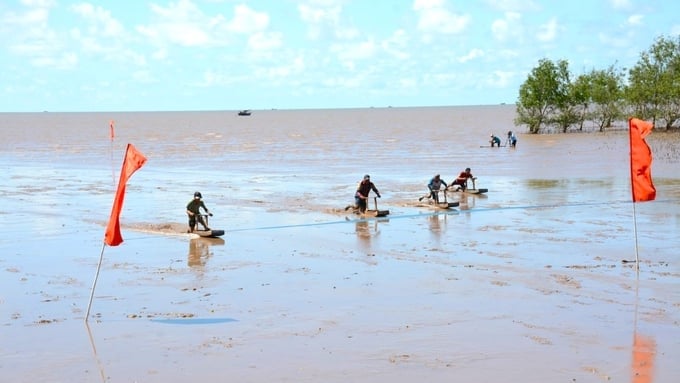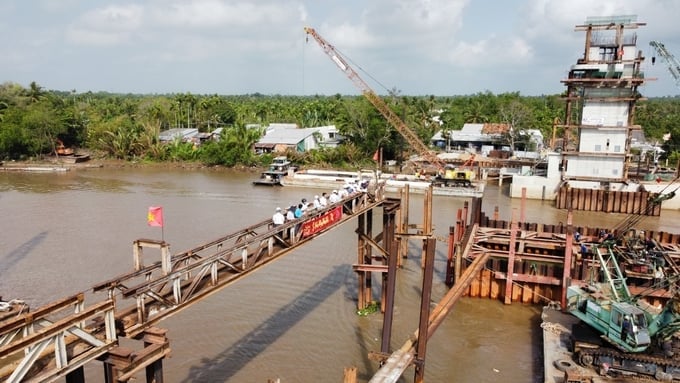June 13, 2025 | 22:52 GMT +7
June 13, 2025 | 22:52 GMT +7
Hotline: 0913.378.918
June 13, 2025 | 22:52 GMT +7
Hotline: 0913.378.918
Soc Trang is one of the ten provinces in the Mekong Delta currently participating in the “Mekong Delta Climate Resilience and Integrated Transformation Project (WB11-MERIT)”. Following the completion of its project proposal, Soc Trang province will submit relevant project documents to the government by August 15.
The project aims to mobilize approximately 863.2 trillion VND to enhance climate change adaptation and resilience efforts. This amount includes 594 billion VND in ODA loans from the World Bank and 239.2 billion VND in local counterpart funds.

Soc Trang, a coastal province within the Mekong Delta region, is currently experiencing the impacts of climate change, including saltwater intrusion during the dry season. Photo: Kim Anh.
Soc Trang Provincial People's Committee reported that the proposal for the MERIT Project was developed based on the Prime Minister's Decision No. 287/QD-TTg dated February 28, 2022, which approved the Mekong Delta Region Planning for the years between 2021 and 2030, with a vision towards 2050.
According to this proposal, Soc Trang plans to develop an irrigation system for various sub-regions. Namely, the plan aims to construct dikes and embankments to protect residential and agricultural production areas from land subsidence, sea-level rise, and widespread flooding.
With a plan extending until 2030, the province will focus on upgrading and completing the primary dike system, including sea dikes and dikes along major rivers to protect various critical areas within the region. Furthermore, the secondary dike system will protect local irrigation infrastructure, while the tertiary dike system will protect small-scale internal land lots.
On the other hand, the project aims to enhance flood control in the low-lying areas of Chau Thanh, My Tu districts and Nga Nam town through the construction of embankments and pumping stations. This activity will stabilize agricultural and aquaculture production across nearly 81,300 hectares.
The project will upgrade and complete 45 kilometers of flood protection dikes in Cu Lao Dung district to prevent overflow, erosion, and flooding. Notably, the project will focus on preventing saltwater intrusion and sea-level rise to ensure the safety of local residents and properties, with an estimated project site of nearly 10,000 hectares.

The Rach Mop Lock, funded by the Ministry of Agriculture and Rural Development and located in Soc Trang province, assists in the management of water resources on the southern bank of Hau River. Photo: Kim Anh.
Soc Trang province has outlined a comprehensive plan for rural livelihood development.
Accordingly, Sub-region 1, which covers the low-lying districts of Chau Thanh, My Tu, and Nga Nam town, will focus on implementing rice production models using the "One Must, Five Reductions" technique and ecological technology. Consequently, the project aims to foster a shift from three rice crops to two crops per year, which corresponds with seasonal patterns and market demands.
Additionally, the plan includes a transition from "monoculture rice" to a "two rice crops combined with freshwater aquaculture" system, with freshwater fish or all-male giant freshwater prawn as potential candidates.
The primary livelihood model in Sub-region 2, which covers Cu Lao Dung district, will involve high-tech brackish water aquaculture and recirculating aquaculture systems, such as fish farming in lined tanks. Moreover, the region will focus on developing livestock farming under fruit trees, such as pineapples and longans, with an emphasis on biotechnology and eco-tourism activities.
Regarding its coastal regions, Soc Trang plans to reinforce and upgrade their sea dike systems and implement irrigation and erosion control measures. Notably, these regions will focus on addressing severe erosion along riverbanks and coastlines.
With comprehensive investments, Cu Lao Dung will be integrated into the existing dike system established by the WB9 Project, thereby creating a comprehensive dike corridor to protect local communities from the impacts of climate change.
Deputy Minister of Agriculture and Rural Development Nguyen Hoang Hiep held a meeting with representatives from various ministries and the ten provinces participating in the MERIT – WB11 Project on August 12 to review the project's progress and ensure that proposals adhere to the established timeline.
For the project proposal approved by the Prime Minister on March 18, 2024 under Decision No. 233/QD-TTg, Soc Trang will receive funding from the Ministry of Agriculture and Rural Development to construct two locks: Ba Xau in My Xuyen District and Dai Ngai in Long Phu District.
Vice Chairman of Soc Trang Provincial People's Committee, Vuong Quoc Nam, noted that investments in the two aforementioned projects will enhance the province's capacity to manage saltwater intrusion from My Thanh River and the southern bank of Hau River. With other previously funded projects, these developments will complete the water control infrastructure in Soc Trang province, thereby improving climate change resilience and supporting agricultural production transformation.
Translated by Nguyen Hai Long

(VAN) In Tien Giang, a high-tech shrimp farm has developed a distinctive energy-saving farming model that has yielded promising results.
![Turning wind and rain into action: [3] 300.000 farmers benefit from agro-climatic bulletins](https://t.ex-cdn.com/nongnghiepmoitruong.vn/608w/files/news/2025/06/12/e5a48259d6a262fc3bb3-nongnghiep-125122.jpg)
(VAN) The agro-climatic bulletin has become a valuable tool for farmers in the Mekong Delta. After more than five years of implementation, the initiative is gradually being expanded nationwide.
![Turning wind and rain into action: [2] Providing forecasts to the people](https://t.ex-cdn.com/nongnghiepmoitruong.vn/608w/files/news/2025/06/12/e5a48259d6a262fc3bb3-nongnghiep-103927.jpg)
(VAN) In addition to improving the quality of hydrometeorological forecasts, putting forecast bulletins into practical use is crucial for production and disaster prevention.

(VAN) Blue carbon is receiving attention for its rapid absorption capacity and vast potential. It represents a promising nature-based solution to respond to climate change.
/2025/06/11/3507-1-161904_583.jpg)
(VAN) Seagrass beds and coral reefs serve as 'cradles' that nurture life in the ocean depths, creating rich aquatic resources in Vietnamese waters.
![Turning wind and rain into action: [1] Forecasting for farmers](https://t.ex-cdn.com/nongnghiepmoitruong.vn/608w/files/news/2025/06/11/e5a48259d6a262fc3bb3-nongnghiep-111919.jpg)
(VAN) Weather is no longer just a matter of fate. Forecasts have now become an essential companion for farmers in every crop season.
/2025/06/10/2501-3-082025_983.jpg)
(VAN) Mr. Le Hoang Minh, Head of Vinamilk's Net Zero project, recently shared insights on the integration of production, energy, and technology in Vinamilk’s green transition journey.